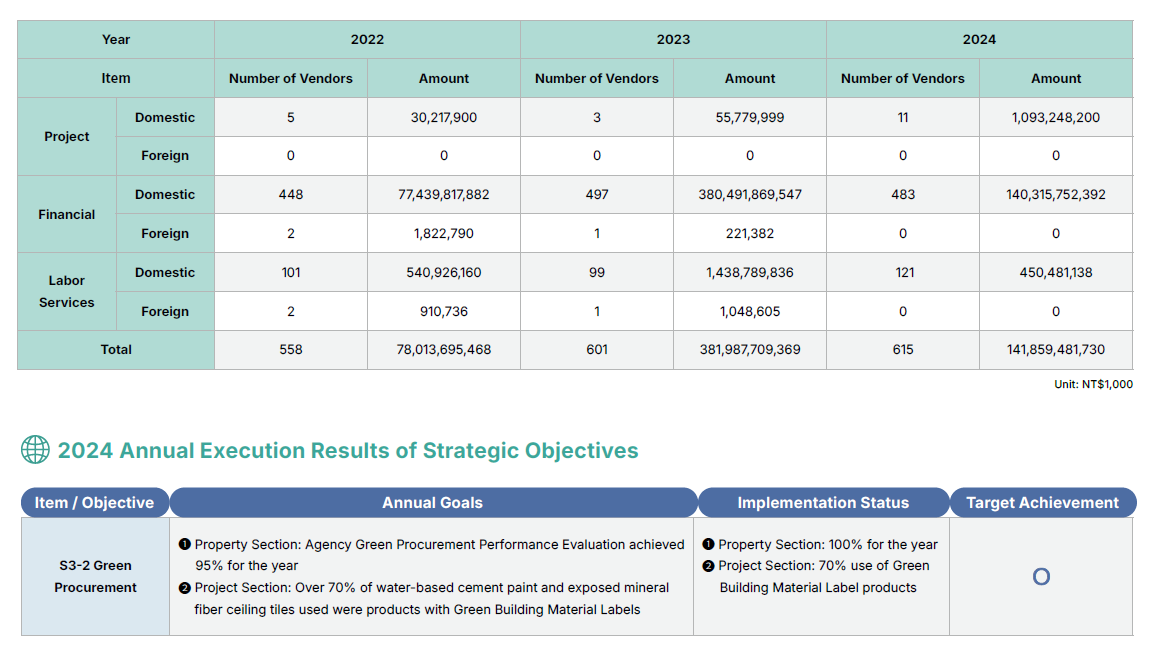Green Hospital
Green Hospital
Building a Green Hospital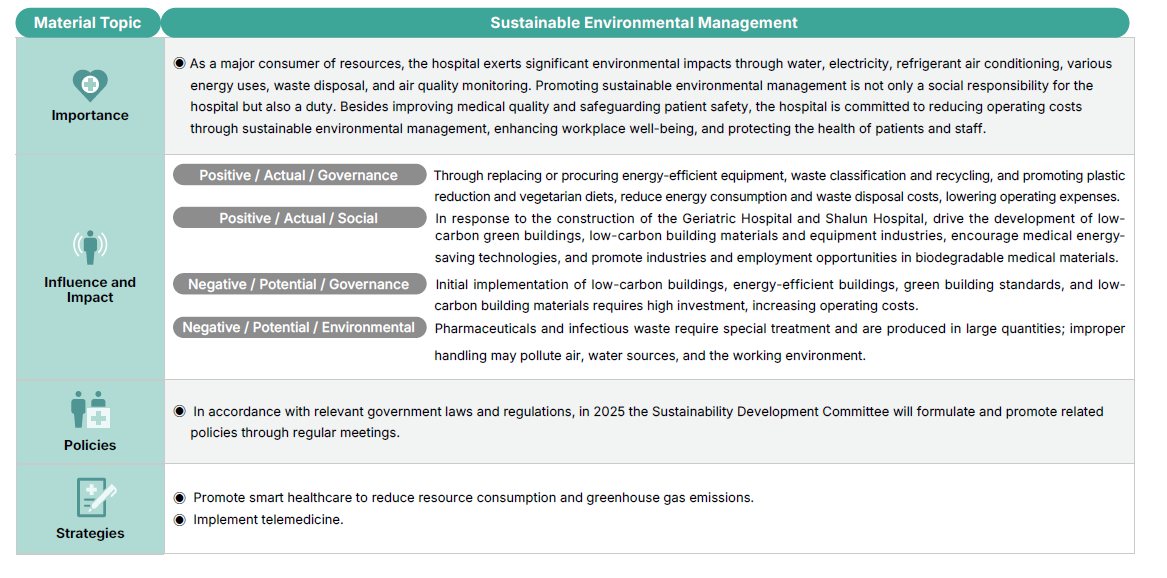
-
Energy Management
In 2024, National Cheng Kung University Hospital's energy consumption totaled 239,203.56 GJ, with electricity as the major energy source accounting for 87.85% of total energy, followed by natural gas at 11.58%. The higher energy intensity in 2024 compared to 2023 is due to the easing of the pandemic, recovery of medical capacity, and continuous operation of facilities.
No greenhouse gas inventory was conducted in 2024, so no related information is available. The inventory process has begun, with plans to disclose 2024 and 2025 data in the next report, and complete third-party verification by 2026.
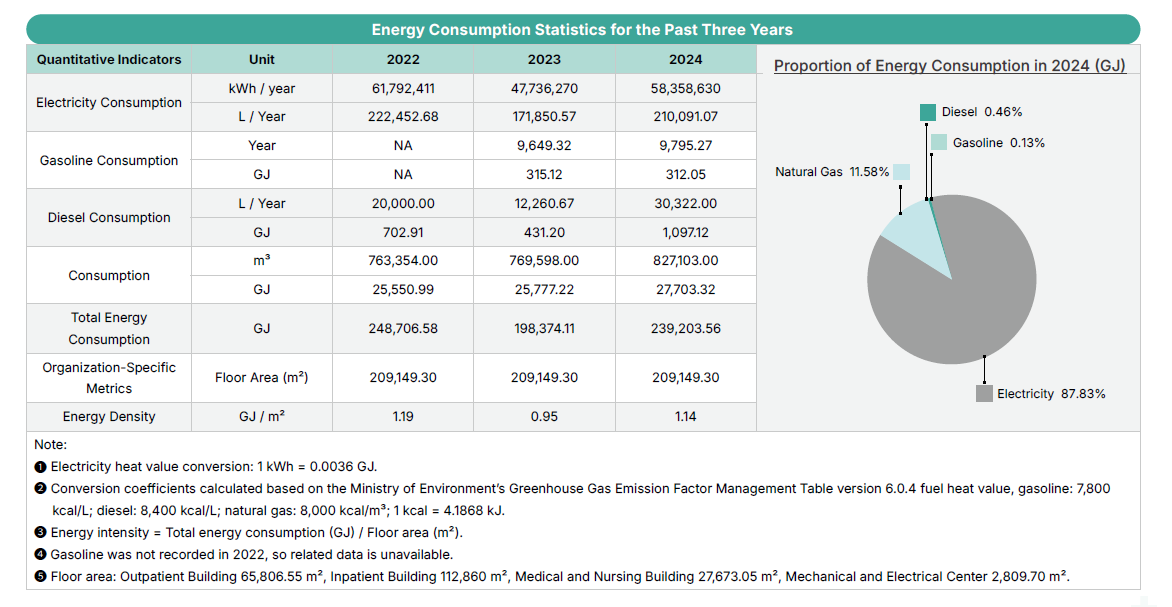
-
Implementation of Real-Time Monitoring System
NCKU Hospital, to implement energy management and net-zero emission policies, has actively introduced a real-time energy monitoring system in recent years to enhance the visualization and intelligent management of energy use. Through the real-time monitoring system, NCKU Hospital can immediately grasp the electricity consumption status of each building and major energy-consuming equipment, perform trend analysis, anomaly alerts, and efficiency evaluations, effectively improving the proactivity and accuracy of energy management.
Energy Saving and Carbon Reduction Achievements
To move towards a green hospital, NCKU Hospital has improved energy use efficiency through equipment replacement and implemented sustainable development goals for medical institutions. In 2024, NCKU Hospital significantly upgraded lighting equipment and air conditioning cooling systems to effectively reduce overall electricity consumption.
To enhance the lighting system efficiency in the hospital area, NCKU Hospital completely replaced old lamps in 2024, converting them into high-efficiency LED panel lights, with a total of 2,642 units replaced, weighing 196,168 kilograms. It is estimated that about 559,370 kWh of electricity can be saved annually, providing bright and safe lighting for the medical environment while effectively reducing daily electricity demand.
Regarding the refrigeration and air conditioning system, NCKU Hospital participated in the Ministry of Economic Affairs’ “Commercial Service Industry System Energy Saving Subsidy Program,” replacing two old chillers on campus with advanced magnetic levitation chillers. The magnetic levitation compressor, featuring non-contact operation, low noise, and high efficiency, can greatly improve cooling efficiency and stability while reducing energy loss.
These two equipment upgrades are estimated to save about 785,373 kWh of electricity annually, significantly improving the operation efficiency of the hospital’s cooling system throughout the year. Through these two measures, NCKU Hospital can save a total of about 1,344,743 kWh of electricity annually, reducing approximately 637 metric tons of CO₂ (Note: coefficient used is 0.474 kg CO₂e/kWh based on 2024 electricity factor), equivalent to the carbon emissions of 1.6 Daan Parks.

-
Reducing Medical Waste Generation
In 2024, NCKU Hospital generated a total of 2,124.34 metric tons of waste during operations, mainly divided into two categories. The first category is non-hazardous waste, including general garbage and recyclable resources. General garbage is handled by qualified environmental contractors and sent to the incinerator owned by Tainan City Government for processing. Recyclable waste is entrusted to organizations licensed by the Environmental Protection Bureau or recyclable waste treatment businesses. The recycling rate for recyclable waste is 21.56%, demonstrating the hospital’s preliminary achievements in resource recycling. The second category is hazardous industrial waste, specifically biomedical waste. The hospital requires waste collection vendors to hold Class A or higher waste disposal permits and to use vehicles, tools, and procedures compliant with the Environmental Protection Department’s “Standards for Storage, Removal, and Treatment Methods and Facilities of Industrial Waste” for collection and transport. The waste is then transported to incinerators or melting furnaces approved by the Environmental Protection Department for incineration treatment.
NCKU Hospital values both upstream and downstream segments of the value chain. It reduces environmental burdens upstream through source reduction and green procurement measures, while actively cooperating with downstream waste handlers to ensure legality and environmental compliance in waste treatment.
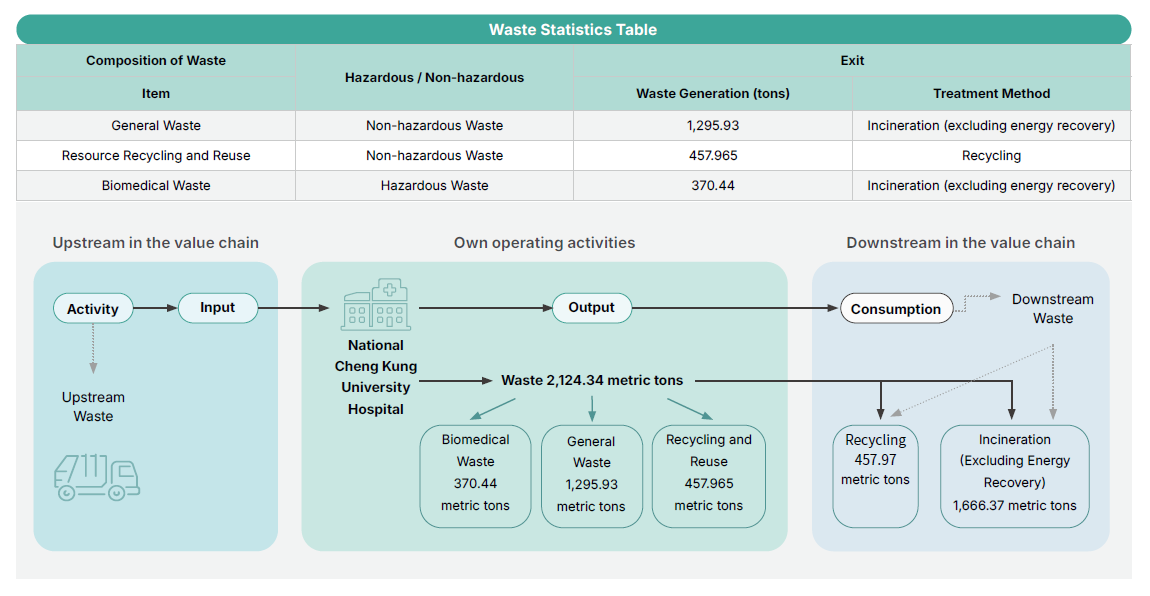

-
Carbon Reduction Benefits of Smart Technology
In the wave of rapid development in medical technology, digital transformation is not only a key strategy to improve medical quality and operational efficiency but also an important approach for medical institutions to fulfill their environmental sustainability responsibilities. As a leading medical center in southern Taiwan, NCKU Hospital upholds the core value of "patient-centeredness," actively promoting digital innovation by integrating artificial intelligence, big data analysis, and smart medical systems to enhance clinical decision support, optimize patient care processes, and comprehensively improve the quality of medical services.
At the same time, digital transformation also provides the medical system with an opportunity to move towards low-carbon sustainability. NCKU Hospital effectively reduces paper usage and energy consumption through measures such as paperless electronic medical records, cloud data integration, telemedicine services, and smart ward energy management, improving resource utilization efficiency and practicing the core concept of "smart is sustainable." These innovative applications not only optimize medical operation processes but also inject new momentum into environmental sustainability, demonstrating the possibility of concurrent medical service excellence and green governance.
-
Procurement Policy
As a public institution, the hospital actively responds to the Ministry of Environment’s promotion of green procurement policies. According to the "Government Procurement Act" and the "Regulations on Priority Procurement of Environmentally Friendly Products by Agencies," the hospital prioritizes purchasing products that meet green procurement standards, such as those with environmental labels, energy-saving labels, and water-saving labels, striving to enhance sustainable procurement performance.
The hospital actively implements a "leasing instead of purchasing" strategy to realize resource recycling and full lifecycle management of equipment. At present, consumables procurement and equipment leasing are concurrently adopted for devices including printers, copiers, and some testing equipment, to reduce resource consumption and waste generation caused by equipment purchase and replacement. There are also multiple advanced medical devices such as hemodialysis machines, peritoneal dialysis machines, radiotherapy systems, and robotic-assisted systems. This strategy not only aligns with the green procurement encouragement for leasing items but also demonstrates the hospital’s concrete actions toward a circular economy and sustainable governance.
In the 2022 to 2024 green procurement performance evaluations, the hospital’s "designated procurement items" achievement rates were 99.98%, 100%, and 100%, respectively; the total scores for the three years were 100 points, 95.1 points, and 99.3 points in sequence, continuously demonstrating a high standard of green procurement performance.
Beyond product selection, the hospital is also committed to paper reduction in the procurement process. It has fully implemented electronic requisition procedures for regular consumables and continues to promote "electronic invoice delivery" to reduce the printing demand for physical invoices, credit notes, and delivery notes, further simplifying the reimbursement process and reducing paper usage, moving toward low-carbon administrative operations.

-
Supplier Management
To ensure the quality of medical services and patient safety, NCKU Hospital strengthens procurement transparency and quality control through rigorous tender evaluation and contract regulations. Strict requirements mandate that suppliers and contractors comply with relevant regulations across the three ESG dimensions.
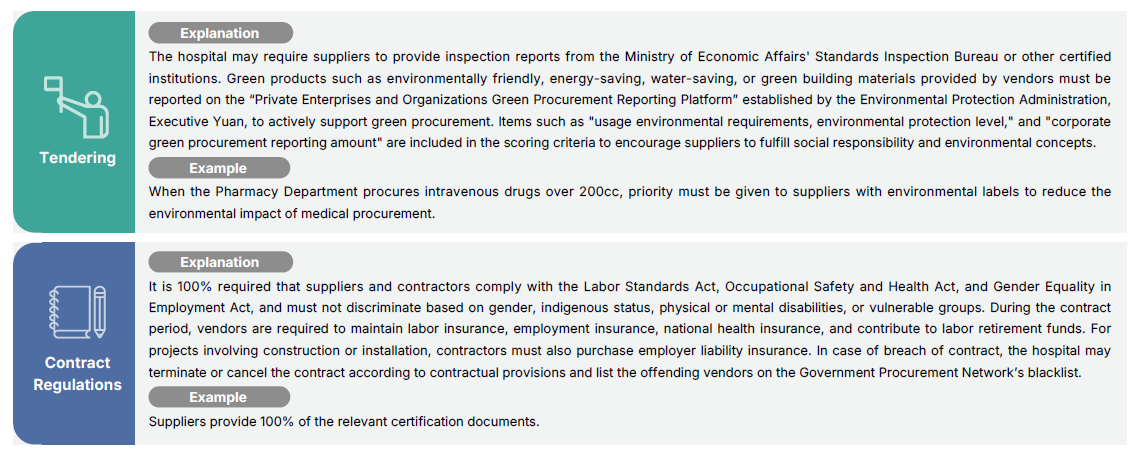
NCKU Hospital conducts procurement in accordance with the "Government Procurement Act" and related subsidiary regulations. For procurement cases exceeding NT$150,000, public tendering is the primary method. Suppliers must prioritize purchasing products with lower environmental impact and procure recyclable, low-pollution, energy-saving products bearing the Green Energy Label in accordance with the "Green Procurement Management Procedures." Selected suppliers and contractors are not listed as barred vendors by the Public Construction Commission of the Executive Yuan. In 2024, a total of 615 suppliers won bids under the "Government Procurement Act," with 100% sourced locally.
